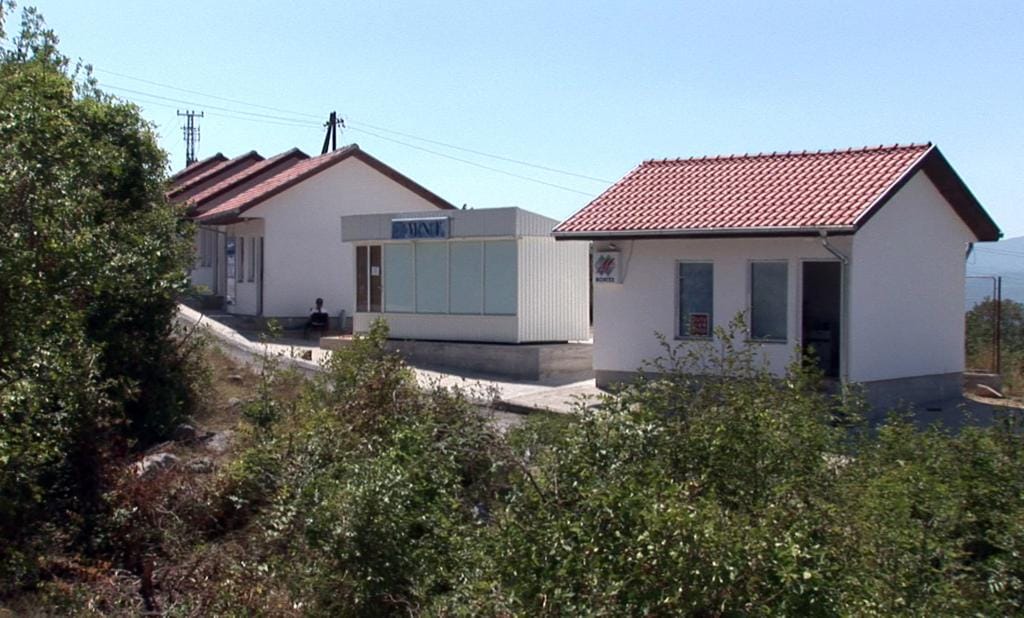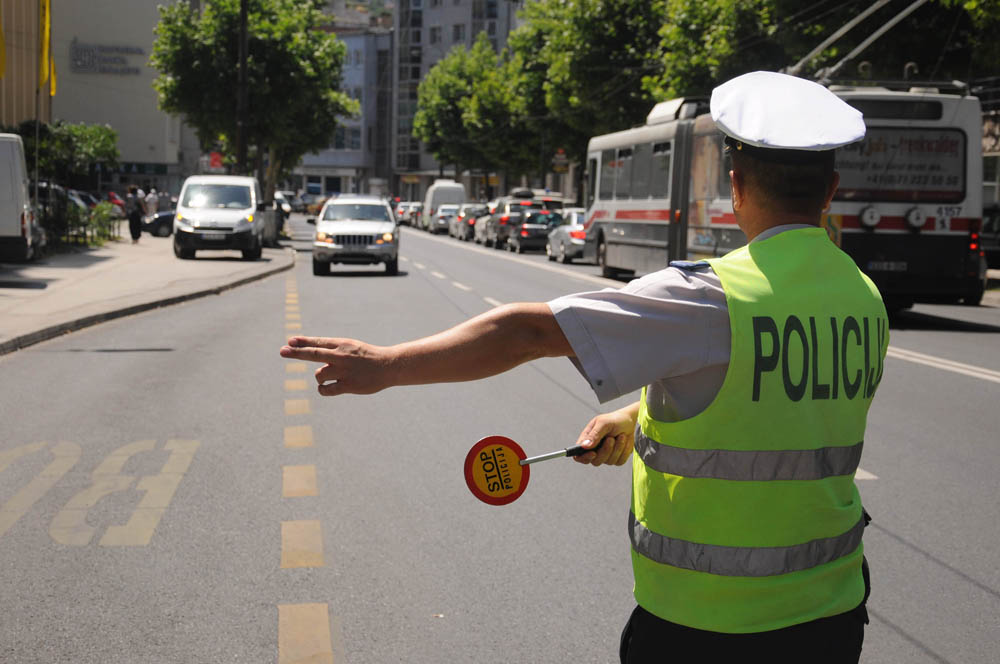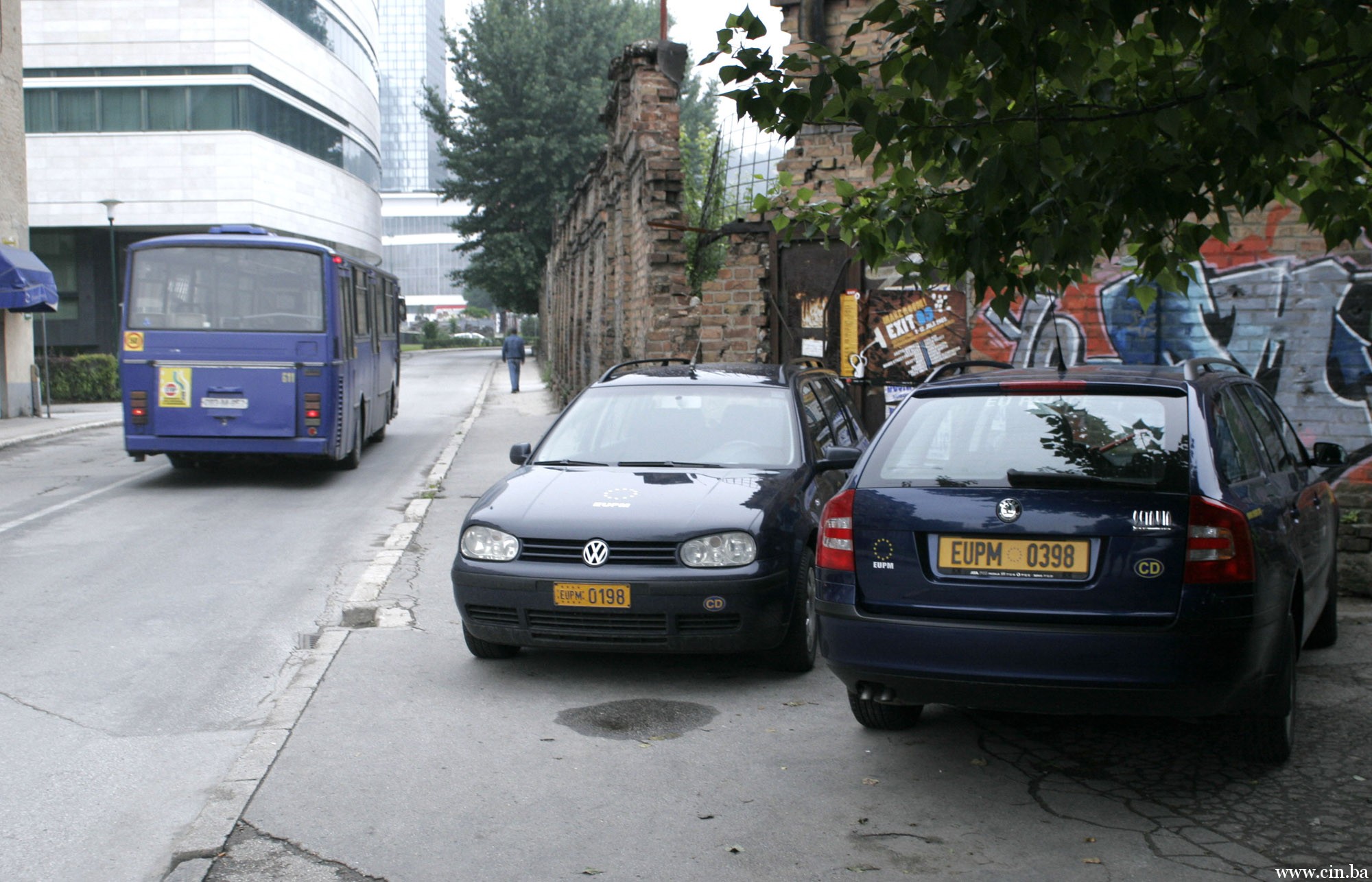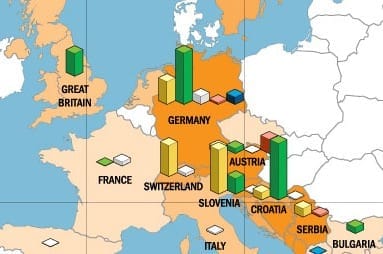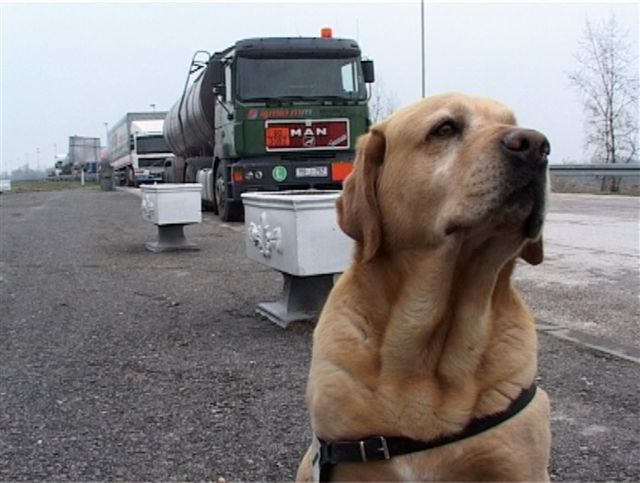Dragiša Inić, a 65 year old unemployed transport worker from Deleuša near Bileća, says he has been run off the land his family has owned since the Austro-Hungarian Empire ruled the territory. He blames cigarette smugglers, who have turned a field where he once grazed his cows and goats into an illegal smuggling route.
A few dozen meters from the field is an old house trailer that sits in no mans land between the border checkpoints of Montenegro and Bosnia and Herzegovina (BiH). It is situated across from six small duty free shops, now closed, which sold cigarettes and liquor to people crossing the border. The shops at the quiet border crossing have the distinction of selling one third of all duty free cigarettes sold in Montenegro – some 1.6 million cartons in just the first nine months in 2007 – or 6,000 cartons per day.
BiH Border Police say the shops were the biggest source of illegal cigarettes entering Bosnia.
‘You see, a truck with goods arrives. It unloads a part for the free shop, and larger part is left on that land. Later they hire people and children who illegally transport cigarettes to BiH for two or three euros’, says Marko Domazet a member of the border police. Those cigarettes are recorded as sold at the shops.
Montenegro recently closed the shops under European Union (EU) pressure. Despite the closures, smuggling still exists in the area.

Inić said his father owned the land where the camp trailer and duty free shops sit. His problems started when they built the shops in 2005. Since then, he has been kicked off of that land and a nearby field he owns by cigarette smugglers, he said.
A review of land records in the municipal court in Bileća shows Inić’s family does own large blocks of land at the border. But boundaries are not clearly specified and the exact border location between the two countries has never been formally agreed upon. The fact that boundary markers like streams have moved over the years complicates the issue. It is not clear exactly who owns the land where the camp trailer and shops sit.
However, the nearby field is owned by Inić’s family, according to land records reviewed by reporters from the Center for Investigative Reporting in Sarajevo (CIN). Police say smugglers built an illegal road through the field using bulldozers. Inić said the men in the trailer, who said they worked for Ranko Radulović, a Nikšić businessman, told him to leave that land because they owned it.

‘These workers sort of threatened me, [saying] this is our property. They thought everything was theirs. I couldn’t even get my cattle out’ Inić said. Inić, who survives on a 200 KM pension from his mother who lives with him and by raising livestock, says smuggling goes on all the time on his property.
Radulović is a convicted cigarette smuggler, according to Montenegrin authorities. He was arrested with six others in 1999 for illegally transporting a truckload of cigarettes into BiH that was worth almost 370,000 KM at the time. After an investigation, the prosecutor’s office in Trebinje indicted the seven, but the court forwarded the case to Montenegrin authorities in Nikšić to prosecute. Nikšić court officials said they prosecuted the case and Radulović paid a fine but served no time.
He may be one of the ‘Brothers Radulović’ an organization police say is responsible for massive drug and cigarette smuggling across the Montenegrin border into Bosnia.
Duty Free
When the government of Montenegro under Milo Đukanović decided to reopen duty free shops in 2005, they were to aid ‘tourism.’ What they quickly aided was cigarette smuggling, say BiH police.
Montenegro closed its duty free shops once before in 2000, which led to a significant drop in smuggling police said. This time, it’s different.
‘According to our intelligence, cigarette smuggling still is taking place along illegal routes through the hills. It’s of lesser amounts, but the smuggling continues. We’re doing everything we can to cut those routes off’ said Adem Salčin, deputy commander of the Border police unit in Trebinje.

Since the closures, police caught and filed a complaint against a smuggler caught with 100 boxes of Ronhill worth over 100,000 KM, Salčin said. The arrest was made close to Inic’s land.
Another group of cigarette smugglers was arrested in the area of Berkovići village.
‘Despite the free shops being closed, smuggling continues to exist’ said Saša Govedarica, a police officer from Trebinje.
All of the land border shops, 26 in all, were closed after the Montenegrin media cited customs and police findings that the activities of the shops were suspicious. Large quantities of cigarettes have been seized in the region that have Montenegrin duty free tax stamps which police believe came from the duty free shops.
Duty free shops throughout the Balkans are a major source of illegal cigarettes. Many are owned by politicians, powerful businessmen and others with links to organized crime. The shops are often used to launder cigarettes or other goods: cigarettes are recorded as being sold at the shop but the transactions never happened, police say. Instead, the tax free cigarettes are sold on the street or smuggled to other countries.
The EU has been pressuring the two remaining duty free operators in the Balkans, Romania and Bulgaria. Bulgaria announced earlier this year they will close their shops within three months.
Duty free shops in Montenegro sold €18.9 million in cigarettes in the first 9 months of 2007, according to a government report.

For the past three years, police at the border say local people would come in and buy dozens of cartons of cigarettes, then carry them in paths around the border on foot. If caught, they would say they were for personal use.
BiH border police reported that many locals were hired for a few euros to make the march. Police said there was nothing they could do.
Montenegro in general has a bad reputation in international circles on the issue of cigarette smuggling. Prime Minister Đukanović had an arrest warrant issued in Italy for involvement in cigarette smuggling, a charge he denies. The warrant was dropped when the court ruled he had diplomatic immunity. Prosecutors in Naples, Bari and Germany allege Đukanović was the key figure in the trade of cigarettes from Montenegro to the Italian mafia and ran a ‘mafia like’ organization.
It was Đukanović, according to a press release on the Montenegrin government’s website, who chaired a cabinet meeting in July of 2005 that reopened the duty free shops in the first place. The decision was made ‘recognizing the necessity of promoting the tourist industry’ although it didn’t explain how duty free shops at a border stop promoted tourism.
A few months before Montenegro closed the shops, Anton Stanaj, an owner of a company that supplies duty free shops, Podgorica-based Rokšped, was arrested in Serbia for tobacco smuggling as he waited to board a plane to Podgorica in Belgrade. Serbian media quoted Serbian Police as saying that Stanaj was alleged to have overseen a major tobacco smuggling ring that was importing fake cigarettes from Dubai and China and selling them to other countries.
Stanaj was doing business with controversial Sarajevo businessman Naser Keljmendi, the Kosovo-born man associated with the Casa Grande Hotel in Ilidža, according to a police intelligence file obtained by CIN. The document from 2007 refers to 2003 intelligence indicating that cigarette smuggling is done by several groups from Kosovo and Montenegro, all of which operate partially out of Sarajevo.
Now the Đukanović government wants to open free trade zones in remote parts of the country. Free trade zones, however, have also been used for tobacco smuggling, especially when they are located near borders.
Free trade zones in Venezuela, Aruba, Panama, Singapore and other places have been successfully used to smuggle cigarettes in the past. British American Tobacco (BAT), one of the world’s largest tobacco companies, was allegedly involved in such a scheme.
According to court documents in the BAT case, companies look for free trade zones located next to countries with porous borders. Goods can be shipped to the free trade zone with little or no taxes collected and then smuggled across the border, where they can be sold for large profits.
Meanwhile, Inić says he is afraid to go near his field now because of the cigarette smuggling that goes on day and night.
‘You must not go out there. Those thugs will kill you. Fifty of them at a time were carrying cigarettes’ Inić said.
First published on March 19, 2008

